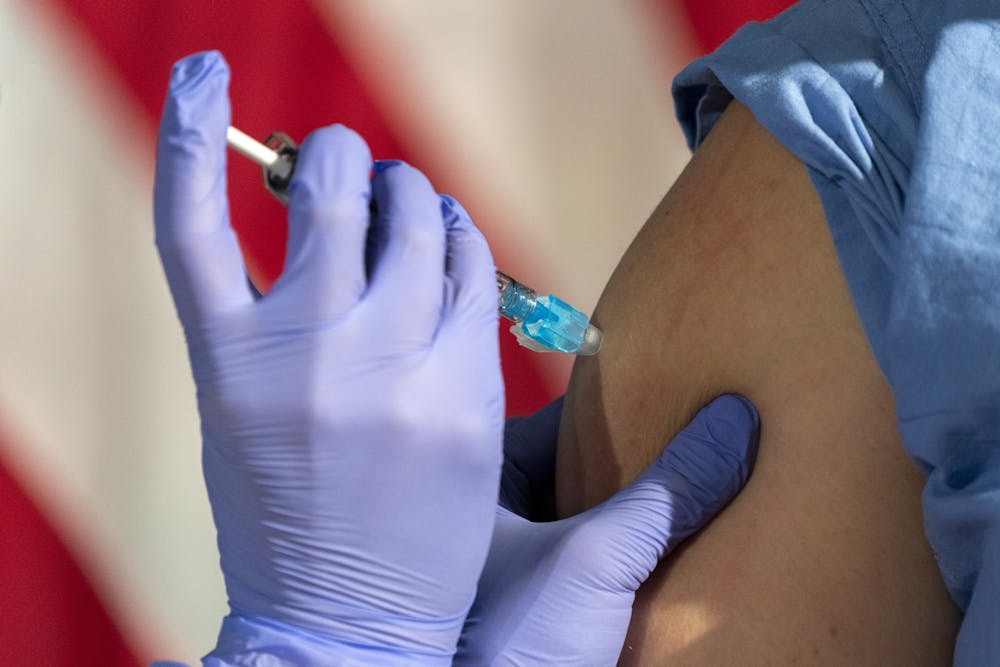The Food and Drug Administration authorized the Moderna COVID-19 vaccine for emergency use Dec.18, bringing Alamance County, North Carolina and the rest of the country one step closer to widespread COVID-19 vaccinations.
The Moderna immunization is now the second COVID-19 vaccine to be approved by the FDA following the authorization of the Pfizer vaccine last week. In a Dec. 15 press conference, Gov. Roy Cooper said the state expects to receive 175,000 doses of the Moderna vaccine this week following its authorization.
“Just over half of those will go to long-term care facilities,” Cooper said. “We expect to get them vaccinated at the end of the month. But beyond that, questions remain.”
Alamance County Health Director Tony Lo Giudice said Alamance County has prioritized the Moderna vaccine over the Pfizer vaccine because of the health department’s existing storage infrastructure. Lo Giudice expects the first shipment of the Moderna vaccine to arrive in Alamance County the week of Dec. 21.
As hope spreads across the country for success with the coronavirus vaccine, Lo Giudice is excited for the future and said that if the health department is unable to receive the Moderna vaccine, they will still be able to store the Pfizer vaccine.
“It’s exciting that it’s happening, and it’s another step in combating this,” he said. “We’ve really got to get the message out: when it's your turn, folks, please, please get vaccinated. The more people we get vaccinated the quicker we can get through this.”
Vaccine distribution comes amid record breaking case numbers in North Carolina for the month of December and a hospitalization rate double that of last month. According to Cooper, it is still unclear how many vaccine doses North Carolina will receive from the federal government going forward, and the current supply of vaccines is very limited.
Dr. Mandy Cohen, Secretary of the North Carolina Department of Health and Human Services, said that while both vaccines boast around 95% effectiveness, there are key differences that led them to target the Moderna vaccine towards “smaller,” “rural” health departments.
First, the Moderna vaccine does not require the ultra-cold storage like what’s necessary for the Pfizer vaccine. While Pfizer must be kept at around minus 94 degrees Fahrenheit, Moderna is stored at minus 4 degrees Fahrenheit and is viable about six times longer than Pfizer.
Second, Cohen said the temperature requirements allow the Moderna vaccine to be packaged in smaller units compared to bundles of 1,000 Pfizer vaccines, which would allow distribution to be more flexible.
College students and the COVID-19 vaccine
According to North Carolina's vaccination rollout plan, college students are among those eligible to receive the vaccine in Phase 3. Lo Giudice said the Alamance County Health Department is working closely with Elon University to make sure the vaccine will be available for Elon students when the time comes.
In a Dec. 17 email from Jeff Stein, chair of the Ready & Resilient Committee, said Elon medical staff are meeting weekly with local officials to plan for vaccine distribution. Stein said that while vaccine doses for students are not expected to arrive until late spring 2021, the university is prepared to execute a vaccine clinic within 24-hours’ notice.
But until the vaccine arrives on Elon’s campus, Lo Giudice urged students, both when they go home for the holidays and when they return in January, to remain vigilant and make smart decisions.
“As we have seen, especially amongst our college population, this thing will spread fast,” he said. “And it is likely that you will have minor effects from it — it may not be serious to you, but it is serious to other folks that have chronic conditions.”
And while he recognizes the possible onset of “pandemic fatigue” following an unusual semester, Lo Giudice hopes students can recognize their role in combating the virus.
“College students are a big part of helping slow the spread,” he said. “They might have a little bit of fatigue, and it's hard not to be able to be up close with your friends and socialize. But continue to take it seriously, practice social distancing, and continue to wear your masks and protect your loved ones.”


